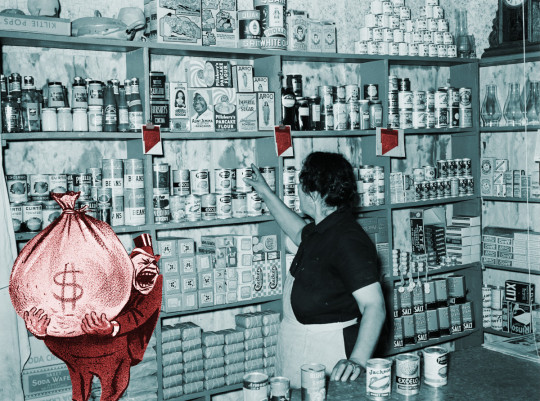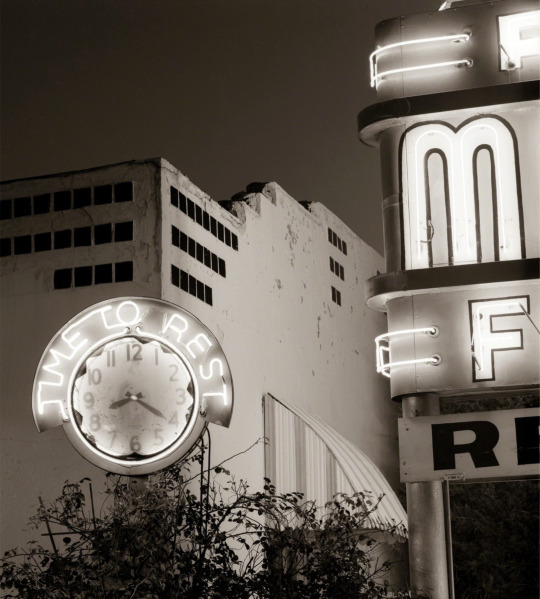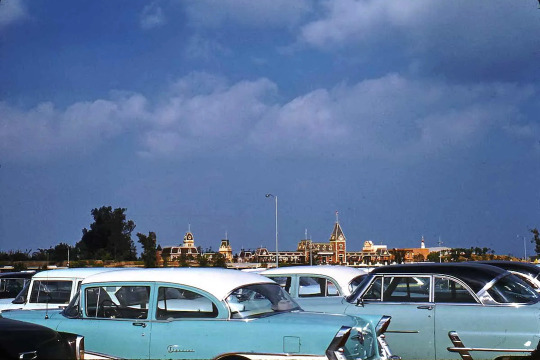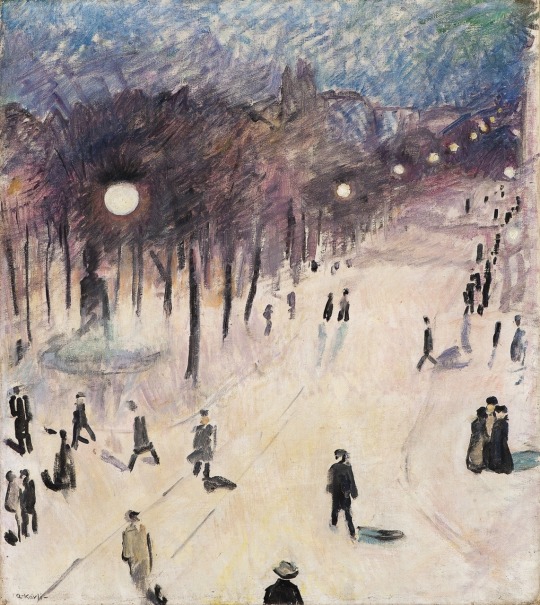#Main Street
Explore tagged Tumblr posts
Text
The one weird monopoly trick that gave us Walmart and Amazon and killed Main Street

I'm coming to BURNING MAN! On TUESDAY (Aug 27) at 1PM, I'm giving a talk called "DISENSHITTIFY OR DIE!" at PALENQUE NORTE (7&E). On WEDNESDAY (Aug 28) at NOON, I'm doing a "Talking Caterpillar" Q&A at LIMINAL LABS (830&C).

Walmart didn't just happen. The rise of Walmart – and Amazon, its online successor – was the result of a specific policy choice, the decision by the Reagan administration not to enforce a key antitrust law. Walmart may have been founded by Sam Walton, but its success (and the demise of the American Main Street) are down to Reaganomics.
The law that Reagan neutered? The Robinson-Patman Act, a very boring-sounding law that makes it illegal for powerful companies (like Walmart) to demand preferential pricing from their suppliers (farmers, packaged goods makers, meat producers, etc). The idea here is straightforward. A company like Walmart is a powerful buyer (a "monopsonist" – compare with "monopolist," a powerful seller). That means that they can demand deep discounts from suppliers. Smaller stores – the mom and pop store on your Main Street – don't have the clout to demand those discounts. Worse, because those buyers are weak, the sellers – packaged goods companies, agribusiness cartels, Big Meat – can actually charge them more to make up for the losses they're taking in selling below cost to Walmart.
Reagan ordered his antitrust cops to stop enforcing Robinson-Patman, which was a huge giveaway to big business. Of course, that's not how Reagan framed it: He called Robinson-Patman a declaration of "war on low prices," because it prevented big companies from using their buying power to squeeze huge discounts. Reagan's court sorcerers/economists asserted that if Walmart could get goods at lower prices, they would sell goods at lower prices.
Which was true…up to a point. Because preferential discounting (offering better discounts to bigger customers) creates a structural advantage over smaller businesses, it meant that big box stores would eventually eliminate virtually all of their smaller competitors. That's exactly what happened: downtowns withered, suburban big boxes grew. Spending that would have formerly stayed in the community was whisked away to corporate headquarters. These corporate HQs were inevitably located in "onshore-offshore" tax haven states, meaning they were barely taxed at the state level. That left plenty of money in these big companies' coffers to spend on funny accountants who'd help them avoid federal taxes, too. That's another structural advantage the big box stores had over the mom-and-pops: not only did they get their inventory at below-cost discounts, they didn't have to pay tax on the profits, either.
MBA programs actually teach this as a strategy to pursue: they usually refer to Amazon's "flywheel" where lower prices bring in more customers which allows them to demand even lower prices:
https://www.youtube.com/watch?v=BaSwWYemLek
You might have heard about rural and inner-city "food deserts," where all the independent grocery stores have shuttered, leaving behind nothing but dollar stores? These are the direct product of the decision not to enforce Robinson-Patman. Dollar stores target working class neighborhoods with functional, beloved local grocers. They open multiple dollar stores nearby (nearly all the dollar stores you see are owned by one of two conglomerates, no matter what the sign over the door says). They price goods below cost and pay for high levels of staffing, draining business off the community grocery store until it collapses. Then, all the dollar stores except one close and the remaining store fires most of its staff (working at a dollar store is incredibly dangerous, thanks to low staffing levels that make them easy targets for armed robbers). Then, they jack up prices, selling goods in "cheater" sizes that are smaller than the normal retail packaging, and which are only made available to large dollar store conglomerates:
https://pluralistic.net/2023/03/27/walmarts-jackals/#cheater-sizes
Writing in The American Prospect, Max M Miller and Bryce Tuttle1 – a current and a former staffer for FTC Commissioner Alvaro Bedoya – write about the long shadow cast by Reagan's decision to put Robinson-Patman in mothballs:
https://prospect.org/economy/2024-08-13-stopping-excessive-market-power-monopoly/
They tell the story of Robinson-Patman's origins in 1936, when A&P was using preferential discounts to destroy the independent grocery sector and endanger the American food system. A&P didn't just demand preferential discounts from its suppliers; it also charged them a fortune to be displayed on its shelves, an early version of Amazon's $38b/year payola system:
https://pluralistic.net/2022/11/28/enshittification/#relentless-payola
They point out that Robinson-Patman didn't really need to be enacted; America already had an antitrust law that banned this conduct: section 2 of the the Clayton Act, which was passed in 1914. But for decades, the US courts refused to interpret the Clayton Act according to its plain meaning, with judges tying themselves in knots to insist that the law couldn't possibly mean what it said. Robinson-Patman was one of a series of antitrust laws that Congress passed in a bid to explain in words so small even federal judges could understand them that the purpose of American antitrust law was to keep corporations weak:
https://pluralistic.net/2023/04/14/aiming-at-dollars/#not-men
Both the Clayton Act and Robinson-Patman reject the argument that it's OK to let monopolies form and come to dominate critical sectors of the American economy based on the theoretical possibility that this will lead to lower prices. They reject this idea first as a legal matter. We don't let giant corporations victimize small businesses and their suppliers just because that might help someone else.
Beyond this, there's the realpolitik of monopoly. Yes, companies could pass lower costs on to customers, but will they? Look at Amazon: the company takes $0.45-$0.51 out of every dollar that its sellers earn, and requires them to offer their lowest price on Amazon. No one has a 45-51% margin, so every seller jacks up their prices on Amazon, but you don't notice it, because Amazon forces them to jack up prices everywhere else:
https://pluralistic.net/2024/03/01/managerial-discretion/#junk-fees
The Robinson-Patman Act did important work, and its absence led to many of the horribles we're living through today. This week on his Peoples & Things podcast, Lee Vinsel talked with Benjamin Waterhouse about his new book, One Day I’ll Work for Myself: The Dream and Delusion That Conquered America:
https://athenaeum.vt.domains/peoplesandthings/2024/08/12/78-benjamin-c-waterhouse-on-one-day-ill-work-for-myself-the-dream-and-delusion-that-conquered-america/
Towards the end of the discussion, Vinsel and Waterhouse turn to Robinson-Patman, its author, Wright Patman, and the politics of small business in America. They point out – correctly – that Wright Patman was something of a creep, a "Dixiecrat" (southern Democrat) who was either an ideological segregationist or someone who didn't mind supporting segregation irrespective of his beliefs.
That's a valid critique of Wright Patman, but it's got little bearing on the substance and history of the law that bears his name, the Robinson-Patman Act. Vinsel and Waterhouse get into that as well, and while they made some good points that I wholeheartedly agreed with, I fiercely disagree with the conclusion they drew from these points.
Vinsel and Waterhouse point out (again, correctly) that small businesses have a long history of supporting reactionary causes and attacking workers' rights – associations of small businesses, small women-owned business, and small minority-owned businesses were all in on opposition to minimum wages and other key labor causes.
But while this is all true, that doesn't make Robinson-Patman a reactionary law, or bad for workers. The point of protecting small businesses from the predatory practices of large firms is to maintain an American economy where business can't trump workers or government. Large companies are literally ungovernable: they have gigantic war-chests they can spend lobbying governments and corrupting the political process, and concentrated sectors find it comparatively easy to come together to decide on a single lobbying position and then make it reality.
As Vinsel and Waterhouse discuss, US big business has traditionally hated small business. They recount a notorious and telling anaecdote about the editor of the Chamber of Commerce magazine asking his boss if he could include coverage of small businesses, given the many small business owners who belonged to the Chamber, only to be told, "Over my dead body." Why did – why does – big business hate small business so much? Because small businesses wreck the game. If they are included in hearings, notices of inquiry, or just given a vote on what the Chamber of Commerce will lobby for with their membership dollars, they will ask for things that break with the big business lobbying consensus.
That's why we should like small business. Not because small business owners are incapable of being petty tyrants, but because whatever else, they will be petty. They won't be able to hire million-dollar-a-month union-busting law-firms, they won't be able to bribe Congress to pass favorable laws, they can't capture their regulators with juicy offers of sweet jobs after their government service ends.
Vinsel and Waterhouse point out that many large firms emerged during the era in which Robinson-Patman was in force, but that misunderstands the purpose of Robinson-Patman: it wasn't designed to prevent any large businesses from emerging. There are some capital-intensive sectors (say, chip fabrication) where the minimum size for doing anything is pretty damned big.
As Miller and Tuttle write:
The goal of RPA was not to create a permanent Jeffersonian agrarian republic of exclusively small businesses. It was to preserve a diverse economy of big and small businesses. Congress recognized that the needs of communities and people—whether in their role as consumers, business owners, or workers—are varied and diverse. A handful of large chains would never be able to meet all those needs in every community, especially if they are granted pricing power.
The fight against monopoly is only secondarily a fight between small businesses and giant ones. It's foundationally a fight about whether corporations should have so much power that they are too big to fail, too big to jail, and too big to care.

Community voting for SXSW is live! If you wanna hear RIDA QADRI and me talk about how GIG WORKERS can DISENSHITTIFY their jobs with INTEROPERABILITY, VOTE FOR THIS ONE!

If you'd like an essay-formatted version of this post to read or share, here's a link to it on pluralistic.net, my surveillance-free, ad-free, tracker-free blog:
https://pluralistic.net/2024/08/14/the-price-is-wright/#enforcement-priorities
#pluralistic#Robinson-Patman Act#ftc#alvaro bedoya#monopoly#monopsony#main street#too big to jail#too big to care#impunity#regulatory capture#prices#the american prospect#Max M Miller#Bryce Tuttle#a and p#wright patman
2K notes
·
View notes
Text




Main St, Bridgeport, CA, 2017
Photography by Xuebing Du
Instagram: xuebing.du
#photographers on tumblr#original photographers#califronia#bridgeport#landscape#main street#American impression
217 notes
·
View notes
Text
Cinderella Castle Anniversary (1st Oct) 🕛🏰🌠

#Walt Disney World#Cinderella Castle#Main Street#Magic Kingdom#Fantasyland#Cloudy Sky#Castle#Disney#Theme Park#Disney Parks#Street Scene#Walt Disney World Resort#Orlando#Florida
136 notes
·
View notes
Text

December 7, 2024
#how does one obtain this beast#zhu zhu pets#guinea pig#animals#motorcycle#vehicles#night#night photography#main street ventura#main street#beach#ventura#ventura california#photography#digicam#nikon coolpix 3200#digital camera#outdoor photography#2024#socal#california#december#adventures with friends#original photography#night time#outdoors#kidcore#nostalgiacore
106 notes
·
View notes
Text

Los Angeles, March 1900. "The Harbor at San Pedro."
#vintage#turn of the century#trolley#California#boats#railroad#docks#hotel#main street#Pacific Ocean#coast#1900s#panorama#ships
61 notes
·
View notes
Text

Royal Motel, Highway 66, Elk City, Oklahoma; 1973. Steve Fitch. Pigment print.
#black and white#photography#fotografia#fotografie#photographie#foto#1970s#hotel#motel#pop culture#oklahoma#travel#neon#neon lights#main street#street scene
387 notes
·
View notes
Text




Christmas lights galore
#grand junction colorado#photography#polaroid photography#street photography#early christmas#christmas lights#downtown#main street#autumn
66 notes
·
View notes
Text
Cute Little Town Designed by Some Creative People Right Here on the Internet :3

My shop is a bakery called “Heavenly Helpings” where I make the cutest cakes, and brownies, and macarons, and eclairs, and pies, and strudels, and everything always smells like freshly baked bread, frosting, and custard—and there’s an upstairs where I live above the bakery :)
At the top of that street is “Uncle Stubby’s Ammo, Liquor, and Tackle shop XD”
Next door, someone submitted “a bookstore called Good Buddy! A pet friendly store that you bring your pet (well trained of course) and where you can read the buy books of any genre! There is also a small coffee shop inside that sells both great drinks and treats for your pets!”
The shop below mine is, “A guinea pig cafe 🥰 tubes and little hideouts run a long the walls with a lower area where people can pick up, pet, and feed the guinea pigs. These guinea pigs are super friendly and love to get treats 12/7. The outside has windows so people can see some of the tubes inside. The back yard has a huge garden to provide all the vegetables and fruit for them. Up stairs is where the owner and his family live.”
And below that, “My shop would be a craft/coffee shop😋 Lots of windows and twinkly lights, and the shop’s colors would be sage green, coral pink, and cream! (Basically colorful but peaceful 😌) It would have all kinds of craft supplies (clay, paint, paper, and chargers for Apple Pencils), and the drinks served could be named after artists and famous paintings! I don’t have a lot of good ideas for a fun name, so I’ll go with Crafts n’ Coffee for now (but that can change)”
Finally, there’s the World’s Market, where you can buy all sorts of things from around the world!
On the other side of the street, we have a gas station for blimps called, “The Descent Diesel”
And below that, “NICKNACKS AND DOODADS!! An antique place where you can find nicknacks, doodads, and trinkets. Ranging from very very tiny things to very LARGE. Ancients, antiques, modern, magical, you name it! Items can be bought or traded. Run by a very organized cat :D bro is not very forgiving if you make the place crash and burn.”
And below that, “A little magical musical theatre. There is a legend that the theatre is haunted by the ghost of an opera singer who never finished her song in one play, so now she sings it every night when the theatre is empty. She's not scary at all though and some people say she helped them find their way back home on very foggy nights. By day, the theatre is a very warm place where everyone feels welcome. Outside it looks a bit like a miniature gothic castle, but its walls are covered with warm, happy posters. It's close to the river and the owner of the theatre is a great friend of the otters from the river that come to the theatre sometimes. There are a lot of flowers in the windows that are not covered with posters.”
Beneath that is the cinema! “I only ever have the good stuff playing in my theater, the bad stuff can premiere in some other theater. Concessions offers popcorn and candy and pizza and hamburgers and spaghetti-- Because why not? And I sell plushies of the movies currently playing. I do annual film festivals to showcase the creations of local movie makers, their film gets to play for a couple of weeks (*and of course they recieve the profits from the ticket sales*).”
Ending with a VHS store :)
120 notes
·
View notes
Text

Main Street, Disneyland, 1966 poster
116 notes
·
View notes
Text
Cinderella Castle 🧨🏰🧨 Magic Kingdom
#Happy New Year#Walt Disney World#Cinderella Castle#Happy Holidays#Main Street#Magic Kingdom#Fantasyland#Castle#Disney#Fireworks#Theme Park#Night Lights#Seasons Greetings#Disney Parks#Street Scene#Walt Disney World Resort#Nightlife#Orlando#Florida#©
131 notes
·
View notes
Text


December 7, 2024
#water#water fountain#watercore#dark#night#night time#flash#flash photography#flash on#beach#ventura#ventura california#california#socal#photography#digicam#nikon coolpix 3200#digital camera#outdoor photography#2024#adventures with friends#december#main street#main street ventura#original photography#night photography#photographers on tumblr#weirdcore#oddcore
48 notes
·
View notes
Photo

Photo taken from the Disneyland parking lot, May 1956
#vintage#cars#1950s#Main Street#Disneyland Railroad Station#Anaheim#Rocket to the Moon#automobiles#California#photograph#The Happiest Place on Earth
677 notes
·
View notes
Text

52 notes
·
View notes
Text

Stortingsgaten - Arne Kavli , n/d.
Norwegian, 1878-1970
Oil on canvas, 67 x 85 cm. .
70 notes
·
View notes
Text
I'm crying. Are you crying?
@tending-the-hearth
51 notes
·
View notes
